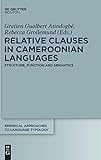Relative Clauses in Cameroonian Languages : Structure, Function and Semantics / ed. by Gratien Gualbert Atindogbé, Rebecca Grollemund.
Material type: TextSeries: Empirical Approaches to Language Typology [EALT] ; 58Publisher: Berlin ; Boston : De Gruyter Mouton, [2017]Copyright date: ©2017Description: 1 online resource (XVI, 287 p.)Content type:
TextSeries: Empirical Approaches to Language Typology [EALT] ; 58Publisher: Berlin ; Boston : De Gruyter Mouton, [2017]Copyright date: ©2017Description: 1 online resource (XVI, 287 p.)Content type: - 9783110467611
- 9783110467673
- 9783110469547
- 496.36096711 22/ger/20231120
- online - DeGruyter
- Issued also in print.
| Item type | Current library | Call number | URL | Status | Notes | Barcode | |
|---|---|---|---|---|---|---|---|
 eBook
eBook
|
Biblioteca "Angelicum" Pont. Univ. S.Tommaso d'Aquino Nuvola online | online - DeGruyter (Browse shelf(Opens below)) | Online access | Not for loan (Accesso limitato) | Accesso per gli utenti autorizzati / Access for authorized users | (dgr)9783110469547 |
Frontmatter -- Preface -- Contents -- Abbreviations -- 1. Kaleidoscopic variations on grammatical themes: Relative clauses in Bantoid languages of Cameroon -- 2. Accessibility and demonstrative operators in Basaá relative clauses -- 3. The augment as a construct form marker in Eton relative clause constructions -- 4. Relative clauses and relativization processes in Nugunu -- 5. Kenyang relative clauses -- 6. Relative clause in (Western) Ejagham -- 7. A prolegomenon to the syntax of the relative clause in the Eastern Grassfields Bantu borderland -- 8. Relative clause constructions in two Yemne-Kimbi languages -- 9. Relative clauses in Vute grammar and discourse -- 10. Relative clauses in Wawa -- 11. Conclusion -- References -- Index
restricted access online access with authorization star
http://purl.org/coar/access_right/c_16ec
This volume is a series of nine (9) contributions to our understanding of relativization strategies in eleven (11) languages of Cameroon spread into the seven (7) sub-branches of the Niger-Congo phylum: Ekoid, Mambiloid, Mamfe, Mbam, Narrow Bantu, Wide Grassfields, Yemne-Kimbi. As a productive strategy in the world’s languages, and considering the evidence that the African language are either under-described, poorly described or not described at all, investigations into the forms, structures and functions of relative clauses and relativization start filling the gap of the absence of analytical descriptive works on the topic. The papers dwelt on the construction of relative clauses, their structure and constraints, their morphosyntactic properties, how they are used to give prominence to topics or participants that are thematic in a given discourse, and to mark the boundaries of units of text, and the formal characteristics of restrictive relative clause constructions. The findings generated so far constitute an endless tank for many fields of hyphenated linguistics including general linguistics, cognitive linguist, applied psycholinguistics, psycholinguistics, neurolinguistics, cognitive psychology, linguistics and pragmatics.
Issued also in print.
Mode of access: Internet via World Wide Web.
In English.
Description based on online resource; title from PDF title page (publisher's Web site, viewed 25. Jun 2024)


